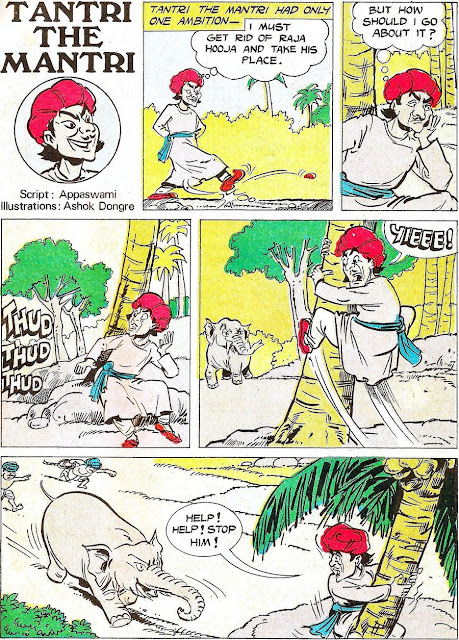Let us
visit once
again with
Mahesh Das, known better as
Birbal, adviser to
Akbar The Great. As i referred to him previously, Birbal is and was part Wise-man, part Wise-ass. I say is and was because Birbal
is a popular figure and his tales are widely adapted. There's
even a recent Akbar And Birbal television series that looks to be quite
enjoyable, with over 170 episodes. And i say was because Mahesh Das
was a real person, named Birbal and proclaimed Raja by the emperor Akbar.
I have an extra fondness for real individuals who transcend the boundaries to become the characters of our stories and legends, like Birbal and
Di Renjie.
(Have we talked about him yet? Hmm...)
Anyway, let's look at some short tales this morning; just 2 to 4 pages in length.
This next tale rings so very, very true to me...
A couple quick notes before this next tale, and some comments after.
A
Baksheesh (bakhshīsh) is simply, and literally, a gift. The term has evolved to mean more of a tip or gratuity, but this was before that.
A
Chowki is a guard house, and thus the watchman you'd find posted there is a
Chowkidar.
Huzoor is a title of respect for one of high rank.
I have seen this story referred to as how Birbal met Akbar, but that's not how i remember it. Also, that reveal at the end is quite different that the versions i originally heard.
How Akbar Met Birbal.
Akbar loved to hunt whenever he was able. One day he was chasing a particularly elusive tiger and his hunting party lost their way. They came to a crossroads where a boy/young man was passing, and Akbar asked him which road travels to Agra.
The young one replied that none of them did. After the party reacted, he explained - roads do not travel anywhere, people do. The Emperor's anger turned to amused agreement, and introductions followed. Mahesh changed his attitude not at all as they spoke, treating Akbar as he would any man.
Akbar was most impressed by both the boy's wit and his courage in standing up as himself, even after learning to whom he was talking. He gave young Mahesh Das a ring off his hand and told the him to come to the court if he wished to join it - Akbar would know and remember him.
Years later, he did. And that is another story. One that is, in part, reflected above, with the chowkidar demanding half the baksheesh, and receiving it as well.
(Note that as i first heard it, Birbal accepted his half of the lashes before explaining that the rest should go to the guard. He was too honorable to not keep his end of the deal.)
The differences being the part in between and at the end.
The difference at the end is that he could not reveal himself as being
Birbal in disguise. This was his first trip to the court, and this was how he
earned having Akbar The Great give him the name Birbal.
In between was a different version of another tale involving a perfect portrait. The framing of it is different in this comic, perhaps to make things more blatant for a younger audience. The artist does not exist in the version i heard, and the noble in question was Akbar himself. Rather than harassing a single artist, it was a challenge to all the artists. Instead of reciting poetry as in the tale above, Birbal joined with the artists and it basically it plays out the same as in this tale...
As i said, i'm merely repeating how i first learned the stories. I'm no Authority on Akbar and Birbal.
So let us continue with a couple more short tales...
Perhaps that tale seemed familiar?
One reason that story might trigger a bit of deja vu is because we already saw another adaptation of this Birbal tale in a
previous post. It's only 4 pages, so we'll run it again here for easy comparison.
As i noted above, Birbal is quite popular and his stories have been told many times, in many ways.
And we'll be telling more here over time.
For now, we've seen the cover for
Birbal To The Rescue before, so here's the cover we haven't seen for
Battle Of Wits -
page art by Ramesh Mudholkar for Adarsh Chitra Katha #6 (Battle Of Wits) and Ram Waeerkar for Amar Chitra Katha #228/618 (Birbal To The Rescue) (1980/97)
































































